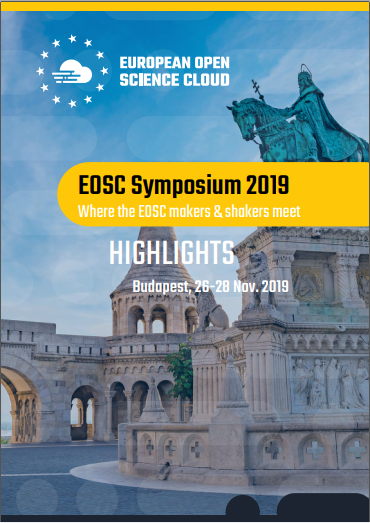The EOSC Symposium represented a fundamental milestone in the EOSC roadmap. It was co-organised by the Secretariat and the main ICT eInfrastructures initiatives, namely, EOSC-hub, GEANT, OpenAIRE and PRACE in collaboration with the EOSC Governance Board, Executive Board and its Working Groups. The event saw three inspiring days during which all stakeholders contributed to discussions on the implementation of the EOSC.
Taking place from the 26th to the 28th of November 2019, in Budapest, Hungary, the EOSC Symposium brought together the shakers and makers in the growing world of EOSC, providing answers to some of the most frequently asked questions about the European Open Science Cloud. We have collected the highlights from these intense and stimulating days in a magazine for the whole EOSC community.
EOSC for the ENVRI community & Life Research Infrastructures
During Day 3, a breakout session focusing on the role of EOSC for life & environmental sciences was organized. Life and environmental sciences are crucial for EOSC. The environmental sciences cluster, ENVRI-FAIR will implement the ENVRI-hub, a virtual, federated machine-to-machine interface to access environmental data and services provided by the contributing RIs. The complete set of thematic data services and tools will be incorporated into the EOSC service catalogue, through the EOSC-hub Marketplace. Researchers produce huge amounts of data, so corresponding computing infrastructures are needed, Diego Scardaci from EGI pointed out. EOSC facilitates this, but the cloud should be highly automated, scalable and always available. The fact that there is more public, open data, and the implementation of FAIR principles can improve productivity of research and development, argued Susanna Sansone, Associate Director of the Oxford e-Research Centre. Frederik Coppens, Head of Node of ELIXIR Belgium, argued that FAIR requirements need to be brought into researchers’ hands, with data management that allows them to generate FAIR data without even realizing it. To achieve this, better software is needed, ELIXIR’s Mateusz Kuzak added, but he also would like to see more guidelines by EOSC on how to develop software. “Translators between the IT world and the scientific world are needed,” Andreas Petzold Coordinator of ENVRI-FAIR concluded. Click here for the presentations from this session
![]()
![]()
![]()
![]()
![]()
![]()
![]()
![]()
Copyright: EOSC Secretariat (Photos adapted from the original source at https://www.flickr.com/photos/185705226@N05/)

